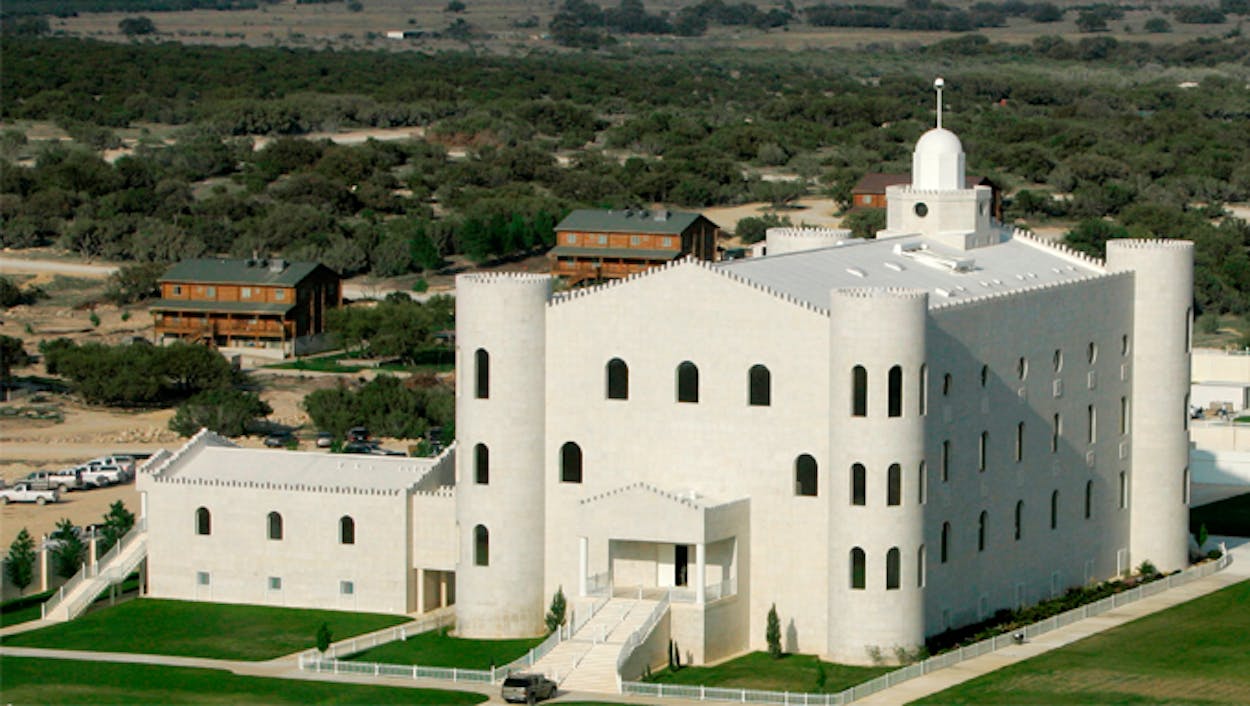Ever since Attorney General Greg Abbott called for seizure of the Yearning for Zion compound in Eldorado, in November 2012, most onlookers have remained cautious about the impending eviction of its residents, members of the Fundamentalist Church of Jesus Christ of Latter-day Saints (FLDS). Consider the unpredictable history. The compound cropped up on the northeast side of town roughly ten years ago, after hundreds of FLDS members followed their leader, Warren Jeffs, to Texas in late 2003. They briskly constructed large wood homes, a watchtower, and a three-story-tall temple. In 2011, when Jeffs was convicted on sexual assault and aggravated sexual assault—pronouncing a scourge, during the trial, “upon the prosecutorial zeal, to be humbled by sickness and death”—they seemed, initially, to further hunker down, building an enormous amphitheater and a second observation tower one hundred feet tall. Then the builders destroyed the recently completed tower, and hundreds of the compound’s residents packed their things and left. (Some reports indicate that some moved to a similar compound in South Dakota.)
So anyone expecting the remaining members to send an FLDS representative to court on January 6, 2014, when Fifty-first District judge Barbara Walther held a hearing to decide if the state could seize their 1,600-acre property as contraband, may have been naively tied to convention. No one appeared in court on the group’s behalf (a result, some suggest, of Jeffs’s instructions that his followers “answer them nothing”), and Walther ruled in favor of the state, allowing law enforcement to “enter the property and take an inventory.”
While the eviction notice giving the residents thirty days to appeal the ruling remains attached to the entrance of 2420 County Road 300, it’s unclear if the church members are accurately interpreting the proceedings. Four days before the scheduled hearing, a man entered the Schleicher County courthouse with partial payment of the church’s 2013 county taxes ($58,100 of a $406,399.22 bill); around the same time, a man walked into the Schleicher County appraisal district office and handed over a check covering the full school district and water tax bill of $401,888.89. One would think that if the group intended to abandon the property soon, they wouldn’t have bothered to pay nearly half a million in taxes, which makes the no-show at the hearing all the more confounding.
At least one person, though, tried to make it clear that the hearing addressed a separate issue than tax payments. On January 2, the same day the two men handed over the checks in Schleicher County, a young man named Rulon Dan Jessop drove from Eldorado to Austin and introduced himself to the Schleicher County ISD lawyer, Sara Leon. “We invited him in,” Leon recounted. “He said, ‘I just wanted you to know that I paid my taxes; hopefully, this means we don’t have to have a hearing Monday.’ And I said, ‘The hearing Monday is the state’s hearing, and they’re seeking other relief.’ He said, ‘I understand,’ and left.”
Come February 6, the appeal deadline will have passed. If the FLDS persists in silence, the land will become property of the state, and the compound’s residents will be asked to leave. We can only guess how many from the Eldorado compound remain, foregoing a move to South Dakota, Colorado, British Colombia, or one of the other locations where the FLDS resides, though a local pilot named J. D. Doyle, who intermittently flies over the property, said he noticed only a skeleton crew in mid-January. “There are no big vehicles left,” he said. “They went from fifteen or twenty cement trucks to two, and those are probably broken down.” With ten to fifteen pickups on the property, he estimated between ten and forty people remaining. “Significantly less than the eight hundred living there before.”
After the property has been vacated, law enforcement will begin taking inventory and the compound will be sold. This raises the question, Who will buy it? Oil-field companies needing housing? A group needing a religious retreat facility? Some in town have imagined a boy’s home or some other nonprofit purchasing the land—situations that would prove problematic for the local school district, which has grown to depend on the ranch’s taxes for 5 to 10 percent of its budget. A few, noting the original watchtower and the community-living structures, have even proposed a minimum-security prison. That would be one way to circumvent a marketing challenge.








